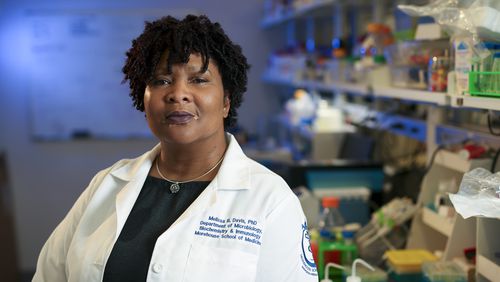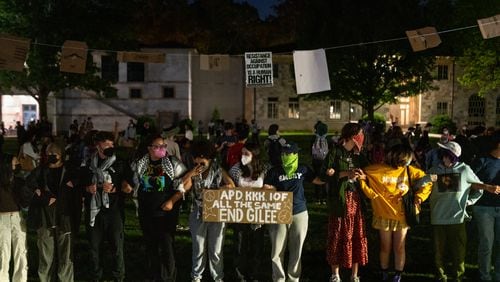Morehouse School of Medicine won a major ‘Cancer Grand Challenges’ award Wednesday to tackle one of the most pressing problems thwarting the fight against cancer: stark racial disparities in cancer care and outcomes.
The $25 million grant funded by the National Cancer Institute and Cancer Research UK is also a major achievement for Morehouse School of Medicine which becomes the first historically Black medical school to receive one of these awards, which draw hundreds of submissions from institutions around the globe.
This award — given to four research areas — marks the first one to focus on health disparities in populations of African ancestry. Melissa Davis, the head of the recently established Institute of Translational Genomic Medicine at Morehouse School of Medicine, will lead the team, the only one in the U.S. led by an African-American woman.
Morehouse School of Medicine is also the first institution in Georgia to receive a grant from Cancer Grand Challenges which was founded in 2020.
Great strides have been made in cancer care over the past challenges. But tough challenges continue to stand in the way. That’s where the Cancer Grand Challenges comes in — funding multidisciplinary teams of scientists around the world to collaborate to carry out innovative, cutting-edge research to solve some of cancer’s biggest problems.
Dean Jones, a researcher at Winship Cancer Institute of Emory University was also a finalist in a different category focusing on why cancer is striking more young adults including those with no obvious risks. Cancer Grand Challenges announced Wednesday that another team led by Andrew Chan at Massachusetts General Hospital and Yin Cao at Washington University in St. Louis won the $25 million grant in that category.
The other winning research teams include one focusing on developing treatments for solid tumors in children and another one zeroing in on T-cell receptors to find better therapies to harness the power of the immune system to fight cancer.
Morehouse School of Medicine’s Davis will lead a team of researchers from 14 institutions in multiple countries. Team SAMBAI (Societal, Ancestry, Molecular and Biological Analyses of Inequalities), includes Ghana, South Africa, the United States, and the United Kingdom, it will focus on breast, prostate, and pancreatic cancer in people of African descent.
“Team SAMBAI made the very impressive case that global diversity in data is required to fully understand the causes of cancer, and to translate this knowledge into prevention and treatment that will achieve equity for all,” said Dr. Tim Rebbeck, professor at Harvard T.H. Chan School of Public Health and lead of Cancer Grand Challenges Scientific Committee in an e-mail. “And they are thinking big — just as is needed to solve the complex issues related to global cancer disparities.”
📢 Announcing five new global #CancerGrandChallenges teams! 📢
— Cancer Grand Challenges (@CancerGrand) March 6, 2024
We're thrilled to announce five new teams, each receiving up to $25m over five years to tackle some of cancer's toughest challenges.
Meet the teams: https://t.co/KUpk5ObOJJ@CR_UK @theNCI pic.twitter.com/aCOpRQx1ej
The “cancer inequities” challenge is aimed at better understanding the interplay among many factors in cancer risks and outcomes, including social determinants of health, behavior, biology, and genetics.
“I think the answer to the question is it’s all of those things to different degrees,” Davis said in a recent interview.
Compared to members of other races, Black people have higher rates of getting and dying from many kinds of cancer, according to the Centers for Disease Control and Prevention.
Although deaths from prostate cancer have dropped substantially in recent decades among all men, Black/African American men are twice as likely as White men to die of prostate cancer and continue to have the highest prostate cancer mortality among all U.S. population groups.
Black people are also more likely than white people to be diagnosed with breast, lung, and colorectal cancers at a late stage. Cancer is harder to treat after it spreads from the place where it started to other parts of the body.
Most inequities are strongly influenced by social determinants and circumstances, people who do not have reliable access to health care are also more likely to be diagnosed with late-stage cancer which might have been treated more effectively if diagnosed at an earlier stage.
But data suggest that genetics and biology also have a role.
Today is #WorldCancerDay. The theme is Close the Care Gap, which is about creating innovative strategies designed to confront health inequities.
— Cancer Grand Challenges (@CancerGrand) February 4, 2024
It's been top of mind at #CancerGrandChallenges, too - cancer inequities was among our 9 newest challenges 👇 https://t.co/mXqRQfQK2u pic.twitter.com/8JEGPQ7oRx
Prior research to address cancer inequities has been skewed by huge diversity gaps.
Most of the work that has informed understanding of what causes cancer has been done in European ancestry populations. Clinical trials mostly enroll white men, with women and people of color consistently underrepresented.
Most new technologies for cancer prevention, early detection, screening, and treatment have not been developed or tested in diverse populations.
About the Author







